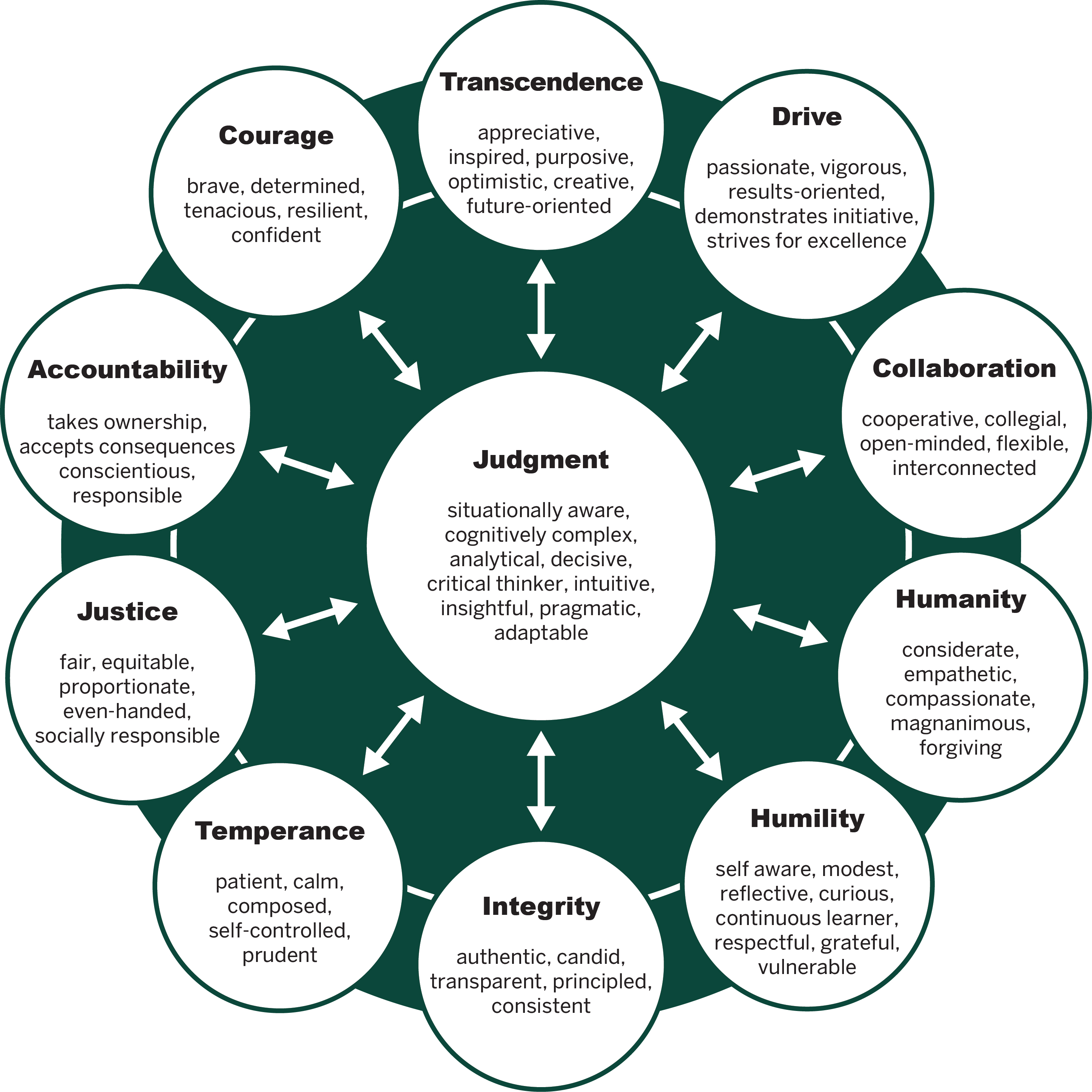Developed by Ivey faculty, Mary Crossan, Gerard Seijts and Jeffrey Gandz, the below framework is the foundation upon which the Institute's research, teaching and outreach is built.
Ivey Leader Character Framework:

Citation: Crossan, M., Seijts, G., Gandz, J. (2016). Developing leadership character. New York, NY: Routledge Publishing.
Leader Character Dimensions
| Dimension | Definition |
| Judgement | Makes sound decisions in a timely manner based on relevant information and critical analysis of facts. Appreciates the broader context when reaching decisions. Shows flexibility when confronted with new information or situations. Has an implicit sense of the best way to proceed. Can see into the heart of challenging issues. Can reason effectively in uncertain or ambiguous situations. |
| Courage | Does the right thing even though it may be unpopular, actively discouraged, and/or result in a negative outcome for him/her. Shows an unrelenting determination, confidence, and perseverance in confronting difficult situations. Rebounds quickly from setbacks. |
| Drive | Strives for excellence, has a strong desire to succeed, tackles problems with a sense of urgency, approaches challenges with energy and passion. |
| Collaboration | Values and actively supports development and maintenance of positive relationships among people. Encourages open dialogue and does not react defensively when challenged. Is able to connect with others at a fundamental level, in a way that fosters the productive sharing of ideas. Recognizes that what happens to someone, somewhere, can affect all. |
| Integrity | Holds oneself to a high moral standard and behaves consistently with ethical standards, even in difficult situations. Is seen by others as behaving in a way that is consistent with their personal values and beliefs. Behaves consistently with organizational policies and practices. |
| Temperance | Conducts oneself in a calm, composed manner. Maintains the ability to think clearly and respond reasonably in tense situations. Completes work and solves problems in a thoughtful, careful manner. Resists excesses and stays grounded. |
| Accountability | Willingly accepts responsibility for decisions and actions. Is willing to step up and take ownership of challenging issues. Reliably delivers on expectations. Can be counted on in tough situations. |
| Justice | Strives to ensure that individuals are treated fairly and that consequences (positive or negative) are commensurate with contributions. Remains objective and keeps personal biases to a minimum when making decisions. Provides others with the opportunity to voice their opinions on processes and procedures. Provides timely, specific, and candid explanations for decisions. Seeks to redress wrongdoings inside and outside the organization. |
| Humility | Lets accomplishments speak for themselves, acknowledges limitations, understands the importance of thoughtful examination of one's own opinions and ideas and embraces opportunities for personal growth and development. Does not consider oneself to be more important or special than others, is respectful of others, and understands and appreciates others strengths and contributions. |
| Humanity | Demonstrates genuine concern and care for others, and can appreciate and identify with others values, feelings, and beliefs. Has a capacity to forgive and not hold grudges. Understands that people are fallible and offers opportunities for individuals to learn from their mistakes. |
| Transcendence | Draws inspiration from excellence or appreciation of beauty in such areas as sports, music, arts, and design. Sees possibility where others cannot. Has a very expansive view of things both in terms of taking into account the long term and broad factors. Demonstrates a sense of purpose in life. |